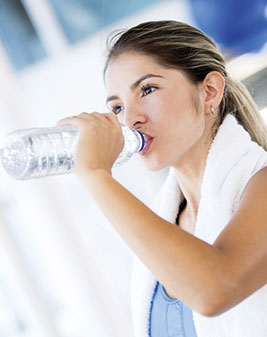
Hot hydration
Getting enough fluids during exercise is important, especially during the warmer months. Rude Health talks to the experts about effective hydration and preparing for the Dublin marathon later this year
Running out of fluids
Jim Aughney is Race Director of the SSE Airtricity Dublin Marathon: “When you run, you sweat. The more you sweat, the more your blood volume decreases and the harder your heart has to work to deliver oxygen to your working muscles. Dehydration can make you feel uncomfortable and cause you to slow down. Drinking while you run will limit these negative effects of dehydration.”
David Gillick, runner and Vhi Women’s Mini Marathon Nutrition Support: “Hydration is hugely important when exercising, and even more so if it is humid. Staying hydrated is essential for peak performance, reducing risk of injuries and muscle cramps and also aids recovery. All athletes need to pay attention to the weather and make sure that they consume drinks containing minerals and salts that the body loses through sweat. Sports drinks are good if you are exercising longer than 60 minutes and after hard activity to help rehydrate and recover.”
How much to drink
Jim Aughney: “A good guide is to weigh yourself before your run and again after. The loss in weight is down to a loss of fluids, so you should aim to replace this as soon as possible. On long runs (depending on temperature) you should bring something with you or place it on the route you are going to use. In general 500ml should be fine to take on longer runs.”
David Gillick: “It is vitally important to make sure you are hydrated before, during and after your activity. Sipping water throughout the day is key. Don’t simply down 1 litre of water before you start, you will only feel all the water swishing around in your stomach and want to go to the toilet. It is also important not to overhydrate. Don’t drink to excess as this will flush all the minerals and salts out of your body. Keep it simple and try it out in training before a race.”
Marathon hydration
Jim Aughney: “We have 10 water stations on the marathon route with water in 330ml bottles and four sports drink stations with 380ml bottles, so in Dublin it is very easy to stay hydrated by taking a bottle at each station.”
David Gillick: “Depending on the length of your run you can bring a bottle with you, grab water at the water station or invest in a running belt which enables you to attach a few small water bottles. Another way is to arrange for someone to meet you at a certain point to provide you with a drink. Some runners don’t like running with bottles as it adds weight.”
Top exercise drinks
Jim Aughney: “Plain water is adequate, but sports drinks offer a couple of advantages. Specifically, they replace some of the sodium and other minerals that your body loses in sweat along with water. In addition, sports drinks provide an extra energy source for your working muscles in the form of carbohydrates. We always tell runners that whatever they plan to use in the race, they should train with it and not try anything new on race day.”
Did you know?
Sweat contains a mixture of electrolytes and minerals, including sodium, potassium, calcium, magnesium, zinc, selenium, manganese, chromium and bicarbonate. Drinking water alone will replace fluids but coconut water and electrolyte drinks containing magnesium are better at preventing cramps due to dehydration after a long run. Avoid sports drinks that contain sugar, artificial sweeteners, artificial colours, preservatives, and other additives that you don’t need.
Dehydration can be dangerous and not drinking enough could lead to fatigue, dizziness, headaches and concentrated (orange-coloured)
urine. Keep drinking when exercising on warm days to avoid this.
Click here to read other Rude Fit articles.
Click here to return to the Rude Health Magazine homepage.